Five Italian female professors on why Dutch women are lagging behind
At least half of the 53 female professors at Radboud University come from abroad. What is going on with equal rights here? Five Italian female professors talk about how Dutch women are spoiled (What do you mean by “time for yourself”?!) and the part-timer principle.
‘Buona sera.’ Titti Mariani, Professor of Plant Sciences, strolls into the shop of caterer J.P. Vincken and greets her friends, who are also fellow professors, in brisk Italian. They eat together on the last Friday of every month, but are now gathering to share a meal with a Vox journalist. ‘You could never do that with five Dutch women’, says Carla-Rita Palmerino, Professor of the History of Modern Philosophy. ‘They would pull out their diaries and it would end up being two months later. We are more used to improvising.’
Part-time
As the antipasti is brought to the table, the women talk in amazement about how so many female professors at Radboud University come from abroad. When it comes to the exact sciences faculties, they make up nearly 100 percent. ‘I really don’t understand it’, says Alessandra Cambi, Professor of Cell Biology in the medical faculty. ‘Dutch childcare infrastructure is so good! You can have kids here without having Granddad and Nan in the neighbourhood, too.’
Mariani points out an economic reason: due to poverty and poor social facilities, Italian women have traditionally been accustomed to working. ‘In the Netherlands, that isn’t necessary—the salaries are high enough.’ Elena Marchiori, Professor of Machine Learning, nods: ‘It is precisely in the less economically developed countries that you see many women in science.’
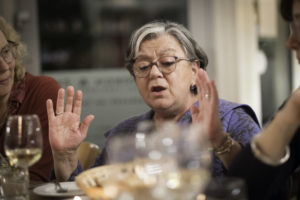
Prosperity may act as a ceiling for equal rights. There is a reason these five Italian women feel that part-time work a Dutch phenomenon: ‘Ask the Dutch girls in secondary school how many hours they plan on working later in life and they’ll tell you 28 hours.’
That may be why there are more working women here (65 percent in the Netherlands versus 49 percent in Italy), but creating a career this way is certainly harder. Cambi: ‘Getting a top position by working 3.5 days a week does not happen.’
Yet that part-timer principle is deeply embedded in the minds of Dutch women. ‘When my oldest son went to sign up for university day care, I was told that a maximum of three days per week is standard and good for your child. After that, it is difficult to say that you want four or five days.’
In countries like France, Italy, and Spain, full-time care is actually very common, whether it is handled by family or not. Despite that, Annalisa Fasolino, Professor of Computational Condensed Matter, recognises that in her generation, many women who wanted to advance in science decided not have children. ‘Because that would have closed a lot of doors for them. Luckily, that is no longer necessary.’
Mariani nods: ‘When I was a postdoc in Germany, I didn’t go to work on a Saturday, because I still had to go grocery shopping and do laundry once in a while. That Sunday, my boss asked me, ‘Where were you yesterday?’ Can you even imagine a life like that with a child?’
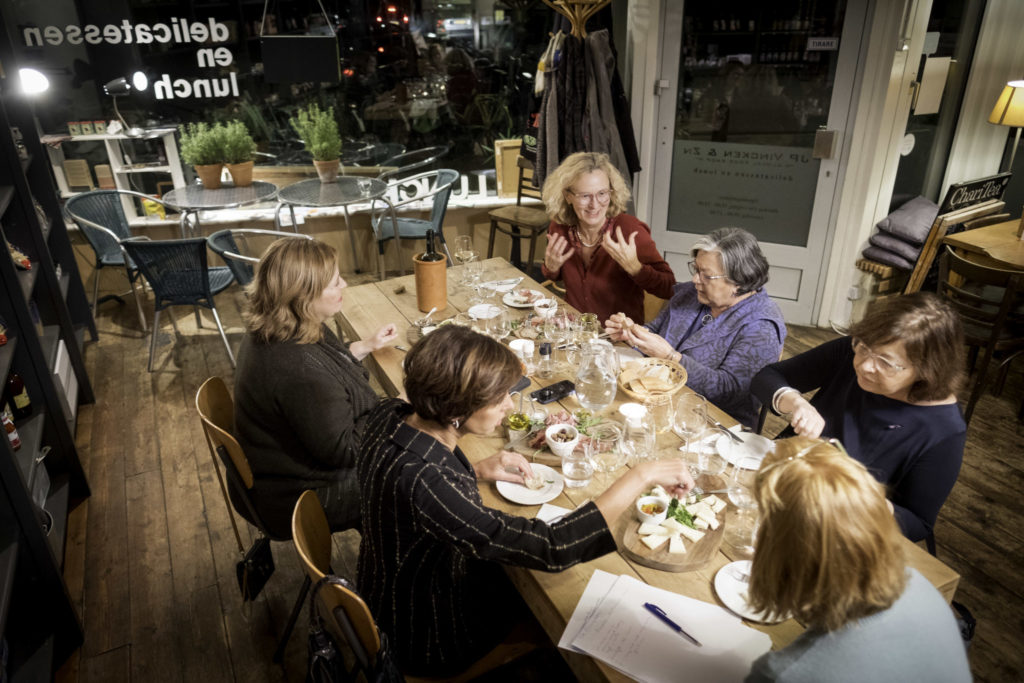
Like sheep
Since then, universities have regulations that provide women with additional time if they become pregnant during a PhD or postdoc programme. However, you go back to working yourself to the bone afterwards. Marchiori points out the high demands for tenure tracks, in which candidates—at least those in the exact science faculties—have to prove themselves within six years, including by bringing in a half million euros. ‘As a tenure track counsellor, I see how much stress and uncertainty this causes, especially for women. These are unnecessary requirements: these people are extremely good; don’t make it so difficult.’
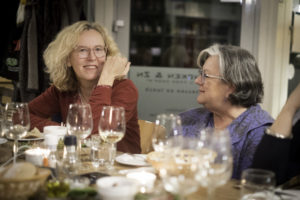
Mariani: ‘My recommendation to Radboud University is to not simply follow what others do like sheep, but rather to create your own policy instead.’
Cambi has a suggestion. She once read an appealing description in an NWO (Netherlands Organisation for Scientific Research) request: “Our institute fosters a safe and pleasant climate and stimulates creativity and low administrative burden.”
Everyone at the table bursts into laughter: Where is that place?!
Cambi: ‘Under the guise of excellence, we are moving towards the impossible and the inhuman, particularly for young people and even more so for women.’
Equal treatment by men could be better, too. In appointment committees, the Italian women all too often hear a sniggering: ‘Well then, RU is in a hurry and has to appoint a few women.’
Fasolino: ‘And then you still have to defend yourself if there are too few women. Why didn’t you try harder? Then I ask: and what did you do?’
Mariani was once asked why she was in a certain committee. ‘Right, because you’re a woman. To which I said: “Or maybe it’s because I’m a member of KNAW (Royal Netherlands Academy of Arts and Sciences)?”‘
Cambi’s manager tried to give her a compliment: ‘Alessandra, you work so hard, sometimes I ask myself: don’t you have to go be with your children?’ Her response: ‘I said it was sweet that you are worried about me, but I don’t think you would have asked if I were a man.’
Profile choice
The gnocchi stuffed with mushrooms are served. ‘Nyotchy’, says the caterer, who is corrected with a chorus of “Nyocky” from the women. We talk about their education. With the exception of Palmerino, they all have a background in the exact sciences. Why is choosing the exact sciences more common for women in Italy? They explained to me that it is established in the educational system. ‘The gap between the humanities and the exact sciences is much larger in the Netherlands than in other countries’, says Palmerino. ‘That already starts in secondary school when you choose a humanities or exact sciences profile. If you choose the humanities, it’s considered kind of lazy.’

Personally, they studied at a school where humanities students also studied physics and mathematics and exact sciences students studied philosophy and history. Mariani: ‘After that, you can do what you want. Here, you’ve chosen your course of study halfway through secondary school.’
This early choice of profile hinders girls in particular. Research shows that, due to pressure from their environment and peers, girls choose the exact sciences less often than would be expected based on their talents. It is still widely felt among young people that the exact sciences are for boys.
Marchiori and her female colleagues visited secondary schools to act as positive role models. ‘Young people have traditional opinions about computing science: that is for nerds and, therefore, boys.’
Fasolino would have done that as well, but she felt unsure about visiting schools due to her broken Dutch. ‘I would have loved more outreach—as a woman in physics, that was really something that suited me. I think that I have played an important role for my students. I took them seriously, even when they were unsure.’
Spoiled
However, we cannot simply blame the men, the educational system, and the culture. We have to point our fingers at Dutch women, too. ‘Dutch women are spoiled. I’m sorry for saying it, but they want to have everything nice and fun, yet they don’t want to work hard for it’, says Mariani.
Palmerino: ‘What strikes me about the Netherlands is how often women ask me, “But when do you have time for yourself?” That is a concept that I was not familiar with in Italy.’
The others nod and say: your job and spending time with your children is time for yourself.
Palmerino: ‘I don’t need to drink coffee on Friday afternoons or work out three days a week.’
Fasolino: ‘When I came here, I needed to have a hobby. Everyone asked me what my hobby was.’
There is a round of laughter—they all recognise this.
Cambi: ‘Maybe it is something intrinsic in the Dutch female population. I see many young female scientists who simply don’t have that drive to go all out for their careers. And that’s fine, but if this is our focus then there still won’t be more than 20-25 percent female professors. I am a different type of woman and I want to be that kind of woman without being put into the ‘too ambitious’ box. What is too ambitious? I feel as if women view me that way more often than men.’

Palmerino: ‘In men, it’s a positive trait, but in women, it’s considered a little too much.’
Cambi: ‘A man is passionate and a woman is aggressive.’
Marchiori: ‘Or emotional. And Italian and emotional at that.’
Palmerino: ‘But I think that we shouldn’t make the situation in Italy…’
The rest of the women join her: ‘…sound like it’s perfect!’
Planning
They did not consciously choose a Dutch university, but ended up there because they were given an opportunity in their field or, like Fasolino, they were following someone they loved. ‘Of course, that is the worst possible reason, at least in terms of your career. In Italy, I had a good job with many responsibilities and here, I was initially only able to get a spot as an assistant professor.’
None of them want to go back to an Italian university. The academic world is very closed off there—’You’ll never find an Italian university with five Dutch professors’—and it’s strongly hierarchical. In terms of organisation and focus on the student, they could learn a lot from the Netherlands. ‘For example, in Italy you’ll have lectures worth 6 course credits, but the lecturer has an enormous ego and provides at least 15 course credits worth of material. No one dares to say anything there. The feasibility for studying the material is given attention here.’
Palmerino: ‘The importance of students is the focus and the learning objectives are discussed. There is a clear idea of what a student must know once they leave the university.’
They are full of praise for the student evaluations after each course and for the voice which students have at the degree programme committees. In Italy, the professor is all too often the lord and master.
Guidance for PhD candidates and postdocs is much better here as well.
Cambi: ‘The knowledge of Italian students is greater: they’re not afraid of looking back into those big books to study. But their critical capacity is much lower.’
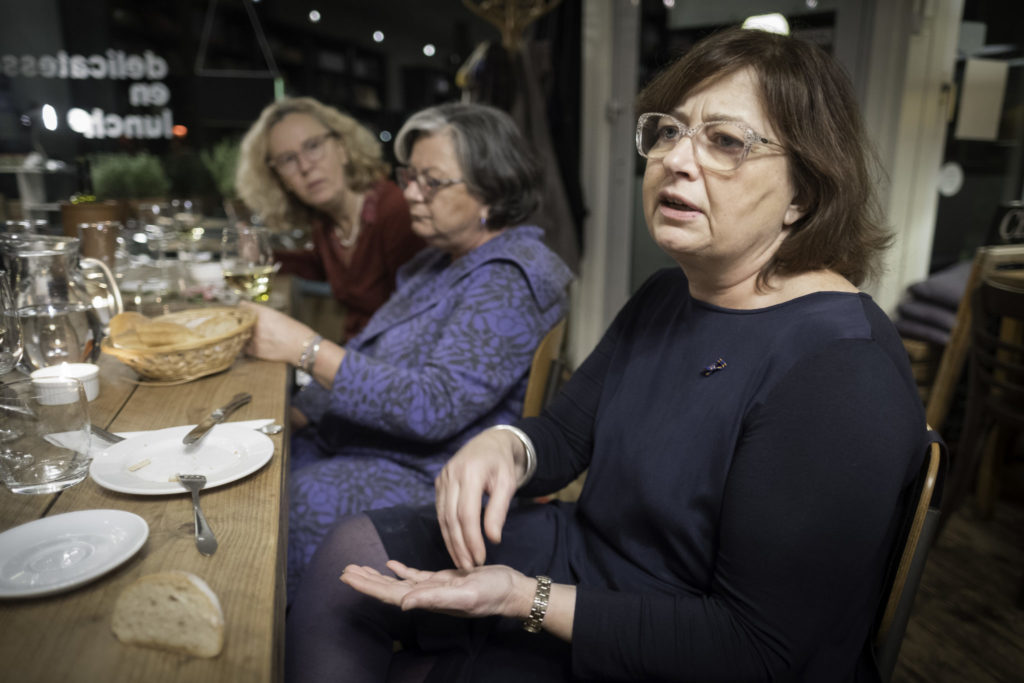
Will they go back to Italy after they receive emeritus status? Mariani doubts it—the three younger women feel at home in the Netherlands. Fasolino, who just gained emeritus status, is going back. ‘If you stay here, you are inclined to just keep working. It’s good to leave and let the university go.’ Without the university, Nijmegen has little to offer her. More importantly, there are two big drawbacks: ‘The sea is too far away and it isn’t flat: you have to bike up so many hills.’ She is going to live by the sea in a village near Rome, her hometown.
‘Rome is built on seven hills, you know’, teases Mariani.
Fasolino promises that she will introduce the concept of planning in Italy. The ladies erupt into laughter again. ‘No, really, it’s great. It saves so much time. We don’t have anything like it.’
Cambi: ‘We have something more like unplanning or poor planning.’
[kader-xl]The Dutch are predictable
Among foreigners, the Dutch are known for being direct. However, the five Italian women think we are predictable, too. ‘Ask a Dutch person how their holiday was and it is always ‘really fun’ and ‘fantastic’. Even if it rained and the flight was late.’
Palmerino smiling: ‘That’s optimism. It’s interesting, it is always said that the Dutch like to complain a lot.’
Marchiori: ‘Dutch people always say, “It was fun, right?”‘
Mariani: ‘My word for the Dutch is “boring”. You can predict exactly what the next sentence in a conversation will be.’
The others think that is going a little too far. Palmerino: ‘They are not boring, but there are more unwritten rules for behaviour—behaviour is more uniform.’
Fasolino also sees the benefits in that: ‘You have a ceremony or a procedure for every occasion, whether it’s a funeral or a birthday, and that’s nice.’
They have more compliments: Dutch men are preferable to Italian ones—three of the women speak from experience. ‘Dutch men really make you feel appreciated’, says Cambi. Fasolino adds: ‘Italian men can’t do anything; they have two left hands.’ They are also spoiled and their wives always blame it on their mothers. The women all confirm the truth in that. Cambi: ‘Dutch men are much more independent: they know how a washing machine works.’
Above all, they appreciate Dutch society for its efficiency, pragmatism, and good social services. ‘We come from one of the most hierarchical societies; one with a great deal of inequality.’ They have not even started talking about political corruption in Italy, the long lines for the post office, and the flimsy decision-making process. Rapid new construction as can be seen on the Nijmegen campus would be impossible in their country. ‘There would be an argument and work would come to a halt or the business would go bankrupt.’
Fasolino summarises: ‘Italy would really be the most wonderful country in the world if a few Dutch people were there to tell them how to do things.'[/kader-xl]
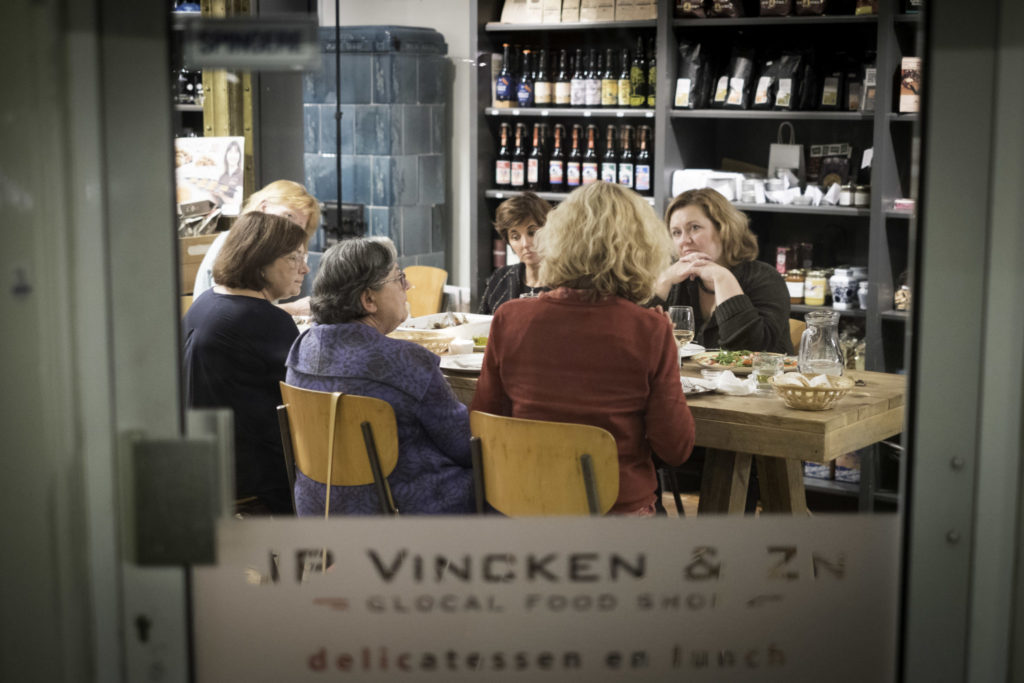




Nick schreef op 23 november 2017 om 09:17
Nice article!
Inge Bleijenbergh schreef op 24 november 2017 om 09:58
I respect these female role professors very much and are grateful for them being role models for the younger generation. However, with blaming young female scientists for not having an academic career because of not working enough hours, they entirely miss the point. Longitudinal research shows that the difference in work-time factor of male and female academics in the Netherlands is small or not significant. The small part-time jobs (below 12 hours) in academia as assistant, associate and full professor are even taken more often by men than by women. Between 61% and 68% of female academics with tenure work full-time, between 71% and 79% of male academics work full-time. Moreover, research repeatedly shows women in academia are as ambitious as men. Please let us stop with blaming particular groups for their lack of career progress and work together on more inclusive organizations, with male and female role models who combine careers and families.
Piet schreef op 28 november 2017 om 18:31
Just because they tell the hard truth (which your statistics let us see) doesn’t mean they don’t tell the truth. That has nothing to do with blaming young females that has to do with blaming the part-time culture that Holland has especially when it comes to married women with kids. Maybe try to really read what they say and comprehend what they’re saying instead of immediately go into defense mode where it really is unnecessary. Because they’re really not in any way blaming young females, if any their blaming a) the system and b) married ‘old’ females).
Luca schreef op 28 november 2017 om 12:50
I believe that consider “having time for your yourself (or the meaningful relationship with friends, families and etc)” for male and female as a luxury is a very toxic thought and attitude for healthy society and community.
Without it, you lose easily concept as a independence, respect to workers and solidarity which exactly what Italy working environment and society are currently lacking.
These people are not realising that what they are criticizing is exacly what makes Dutch working environment good.
Piet schreef op 28 november 2017 om 18:27
Only that’s not what they mean, what they mean is that dutch women want time for themselves apart from family time or going to friends with their spouses, they want something for themselves, which is the odd thing compared to women in other countries. And it’s true women here when they have kids and are married still feel the need to go on vacation with their other female friends or go play tennis with their other female friends. That’s weird compared to almost every other culture.
Kees schreef op 29 november 2017 om 00:50
While that may be true Luca, for a healthy situation, it will also hinder women from reaching 50/50 at the very top, as there will always be guys going ambitiously for the top in ‘an unhealthy way’ supported by a wive who want their husband to achieve that position.
Nick schreef op 29 november 2017 om 01:33
What an islamophobic article and group! Not a word about the already huge number of Muslim Dutch women…
Jennifer schreef op 29 november 2017 om 10:04
Are you literally retarded, Nick? Nowhere in this article has ANYONE mentioned muslims. Why you bring up this shit is beyond my comprehension — please remove yourself from this conversation.
Auke schreef op 29 november 2017 om 08:44
Not sure if we have read the same article. They have some critics on the dutch but also point out the good things.
For example (maybe the best compliment) : Fasolino summarises: ‘Italy would really be the most wonderful country in the world if a few Dutch people were there to tell them how to do things.’
Marie schreef op 29 november 2017 om 10:04
Try better, troll.
Henk schreef op 29 november 2017 om 10:48
“At least half of the 53 female professors at Radboud University come from abroad. What is going on with equal rights here?”
We have a lot of equal opportunities here in the Netherlands, and I honestly believe there is no sexism or racism involved in the hiring policy for the top positions. It’s not an equal rights issue. Go ask any leadership figure in any large organisation, be it a law firm, bank, university; they’ll all tell you that they really want more women in those higher positions. Why can’t they hire them? Because they’re just not there. Which means basically that given the choice, in countries as ours with equal opportunities, women just don’t choose those jobs and careers. They choose other things, and most will tell you that they just rather have a life (kids, family, “time for themselves”) than work themselves to death for a career or money. Men en women are just different, and they make different choices in life. That’s why most nurses are female, most soldiers are male, and all the other (oh no the horror) stereotypes about gender and work and family life usually check out. Like that workaholics are usually men. It’s called biology.
“Prosperity may act as a ceiling for equal rights.”
Oh please, just consider the fact that given enough money already, women often just don’t choose a high level career, but instead choose to have kids, a family, a 28hr/week job, and enjoy life? Aren’t all these great little differences between man and women not something to celebrate anymore?
Please stop promoting these Marxist ideas, it’s dangerous.
Johan schreef op 6 december 2017 om 17:46
…. on why Dutch women are lagging behind? ………. spoiled? ……. without the university, Nijmegen has little to offer her. WHAT?
sounds more “frustrated”, or should I say jealous to me, ……… they can and never will be ………….. Dutch! I am so proud to be Dutch and to all Dutch neighbours, finding a balance – in general – between a life and a very successfull (science) carreer, regardless being …… a women, man (……… or anything in between).
& What do you mean:
without the university, Nijmegen has little to offer
“None of them want to go back to an Italian university. ………….. ’You’ll never find an Italian university with five Dutch professors’
Nijmegen has little to offer? You dare! ah, no life
Not a matter of ‘want’ to go back …………… and sorry, correction here, therefor you will always be “Italian” professors ……….. (read again your own article title: Five Italian female professors … you are scientists? proofreading manuscript submissions?)
You did not make yourself very popular with this article
Francesca schreef op 17 februari 2018 om 21:50
Johan, I see that luckily for you, you never made the experience to be a foreigner. Try. You can discover that despite of the fact that you are a top professor or a top manager, you will feel always a foreigner. It would be nice to be at home but strangely it happens that 5 Italian professors have to teach abroad.It makes no sense, indeed.we should understand what is going on.and I think that we should address questions to the Italian government.when there will be a proper one I will ask.I will let you know.for now we just know that we are in the EU, and despite of the many cultural differences we have to deal with, there is the big chance nowadays to “live” together with other people. Maybe join foreigners, have a dinner with them, a beer, try to know them and let them know you and how Dutch women are not spoiled .
Patrick schreef op 18 maart 2018 om 00:13
Italy is the country that tried to convict scientists for having failed to predict an earthquake. This is an 17th century attitude! So rather than criticizing the Netherlands Italians should rather put their house in order, and their is a lot to do.
This is not a joke sadly : https://www.thelocal.it/20170926/university-teachers-under-house-arrest-over-corruption-after-being-unmasked-by-an-english-academic
A corrupt and underperforming academia, nothing to be proud of.